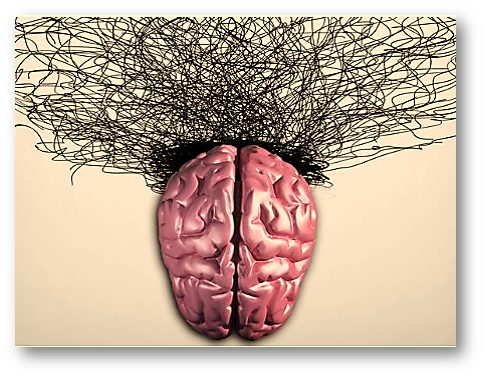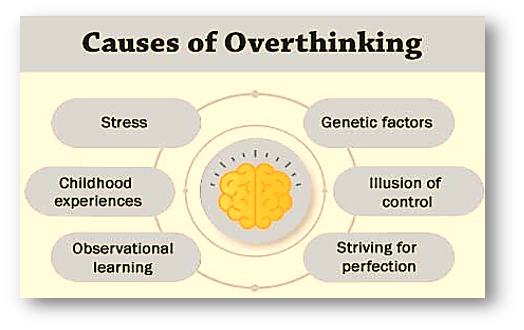OVERTHINKING!!
Overthinking refers to excessive and prolonged thinking about a problem or situation, often leading to anxiety or stress. It can be caused by a variety of factors, including a lack of confidence in one’s ability to handle a situation, a fear of failure or disappointment, and a tendency to ruminate on negative thoughts. To reduce overthinking, it may be helpful to engage in activities that distract the mind, such as exercise, meditation, or a hobby, and to practice mindfulness techniques that encourage one to focus on the present moment. Additionally, talking to a therapist or counselor can help to address underlying issues that may be contributing to overthinking.
OVERTHINKING NATURE!!
Overthinking is a common cognitive process that can be a natural response to certain situations. It can be a way for the brain to process and make sense of information, and can also be a sign of intelligence and problem-solving ability. However, when overthinking becomes excessive and leads to negative consequences such as anxiety, stress, or difficulty making decisions, it can be considered a negative aspect of human nature. Some people may be more prone to overthinking due to their personality, past experiences or other factors. It is important to understand that overthinking is a natural process that can be managed and controlled with various strategies such as mindfulness and therapy.
HOW DOES OVERTHINKING THE BRAIN WORK CLINICALLY??

Clinically, the brain of an overthinker may exhibit certain patterns of activity, depending on the underlying cause of the overthinking. However, some general observations have been made about the brain activity of overthinkers.
Increased activity in the Default Mode Network (DMN):
The DMN is a network of brain regions that is active when the mind is at rest and not focused on the external world. In overthinkers, the DMN may be more active than usual, leading to excessive rumination and self-referential thinking.
Increased activity in the amygdala:
The amygdala is a brain region that plays a role in the processing of emotions, particularly fear and anxiety. In overthinkers, the amygdala may be more active, leading to increased feelings of anxiety and stress.
Decreased activity in the anterior cingulate cortex (ACC):
The ACC is a brain region that plays a role in regulating emotions and controlling attention. In overthinkers, the ACC may be less active, leading to difficulty in regulating emotions and controlling attention.
Increased activity in the prefrontal cortex:
The prefrontal cortex is a brain region that plays a role in decision-making, planning, and self-control. In overthinkers, the prefrontal cortex may be more active, leading to excessive analysis and decision paralysis.
It’s worth noting that these observations are based on studies of people with certain mental health conditions, such as Generalized Anxiety Disorder (GAD) and Obsessive-Compulsive Disorder (OCD), which are characterized by excessive thinking, but not all overthinking is a symptoms of a mental health condition. Therefore, the brain activity of an overthinker can vary depending on the cause of the overthinking and the individual. It is important to consult a mental health professional for a proper diagnosis and treatment.
WHAT ARE OVERTHINKING SYMPTOMS??

Overthinking can be a symptom of several mental health conditions, including:
Generalized Anxiety Disorder (GAD):
People with GAD tend to worry excessively about a variety of things, including everyday events and activities. Overthinking can be a symptom of GAD, as excessive worrying can lead to difficulty relaxing or sleeping.
Obsessive-Compulsive Disorder (OCD):
People with OCD may have recurring, unwanted thoughts, images, or impulses that they try to neutralize by performing certain rituals or routines. Overthinking can be a symptom of OCD, as the person may be trying to make sense of the obsessions or prevent something bad from happening.
Depression:
Overthinking can be a symptom of depression, as negative thoughts and feelings can become overwhelming and difficult to shake.
Post-traumatic stress disorder (PTSD):
People with PTSD may have flashbacks, nightmares, or other memories of traumatic events, which can lead to overthinking and reliving the traumatic experience.
It’s worth noting that overthinking can also be a symptom of stress and burnout. In these cases, it can be helpful to identify the sources of stress and develop strategies to manage and reduce it.
If you feel that overthinking is causing significant distress in your life, it is important to talk to a mental health professional for a proper diagnosis and treatment.
HOW DO YOU STOP OVERTHINKING??

Stopping overthinking can be challenging, but there are several strategies that can help:
Practice mindfulness:
Mindfulness is the practice of being present at the moment and not getting caught up in thoughts about the past or future. Mindfulness techniques such as meditation, yoga, and deep breathing can help to reduce overthinking by allowing you to focus on the present moment.
Challenge negative thoughts:
When you find yourself overthinking, try to identify the negative thoughts that are causing the overthinking. Once you’ve identified the thoughts, challenge them by asking yourself if they are based on fact or if they are just assumptions.
Keep yourself busy:
Engage in activities that distract your mind from overthinking, such as exercise, reading, or a hobby.
Get enough sleep:
Lack of sleep can contribute to overthinking, so make sure you are getting enough rest.
Talk to someone:
Sometimes, talking to a friend, family member, or therapist can help to put things into perspective and provide a different perspective on the situation.
Reframe your thoughts:
Instead of dwelling on negative thoughts, try to reframe them in a more positive light.
Learn to let go:
Accept that you cannot control everything and learn to let go of things that you cannot change.
Remember that overthinking is a habit, and like any habit, it can take time and practice to change. Be patient with yourself and don’t be discouraged if you don’t see improvement right away.
IS OVERTHINKING A MENTAL HEALTH??
Overthinking can be a symptom of several mental health conditions such as Generalized Anxiety Disorder (GAD), Obsessive-Compulsive Disorder (OCD), Depression, and Post-traumatic stress disorder (PTSD) as well as stress and burnout. In these cases, overthinking can cause significant distress and negatively impact the person’s quality of life.
Prolonged and excessive overthinking can also lead to physical symptoms such as fatigue, headaches, muscle tension, and difficulty sleeping. It can also affect a person’s ability to make decisions, socialize, and perform daily tasks.
In some cases, overthinking can be a sign of an underlying mental health condition or can develop into one if left untreated. It is important to address overthinking if it is causing distress in your life, a mental health professional can help you determine the cause of your overthinking and develop an appropriate treatment plan.
It’s worth noting that not all overthinking is a problem and some level of thinking is necessary for problem-solving, decision-making, and learning. However, when overthinking becomes excessive, it can be harmful to mental health and should be addressed.
IS OVERTHINKING A PROBLEM??
Overthinking can be both helpful and problematic. On one hand, some level of thinking is necessary for problem-solving, decision-making, and learning. However, when overthinking becomes excessive and leads to negative consequences such as anxiety, stress, difficulty making decisions, and difficulty functioning in daily life it can be considered a problem.
Prolonged and excessive overthinking can lead to physical symptoms such as fatigue, headaches, muscle tension, and difficulty sleeping. It can also affect a person’s ability to make decisions, socialize, and perform daily tasks. It can also cause negative thoughts and feelings, such as anxiety, fear, or depression.
In some cases, overthinking can be a symptom of an underlying mental health condition, and it can develop into one if left untreated. If you feel that overthinking is causing significant distress in your life, it is important to talk to a mental health professional for a proper diagnosis and treatment.
It’s important to understand that overthinking is a natural process that can be managed and controlled with various strategies such as mindfulness, therapy, and lifestyle changes. If you feel that your overthinking is impacting your daily life, it’s worth exploring some of the methods mentioned to help manage the problem.
HOW TO CLEAR YOUR MIND??
Clearing your mind can be challenging, but there are several strategies that can help:
Practice mindfulness:
Mindfulness is the practice of being present at the moment and not getting caught up in thoughts about the past or future. Mindfulness techniques such as meditation, yoga, and deep breathing can help to clear your mind by allowing you to focus on the present moment.
Engage in physical activity:
Exercise, such as going for a run, doing yoga, or hitting the gym, can help to release tension and clear your mind.
Get enough sleep:
A lack of sleep can contribute to a cluttered mind, so make sure you are getting enough rest.
Write it down: Sometimes, writing down your thoughts can help to organize them and clear your mind.
Take a break:
If you find yourself getting overwhelmed, take a break and do something you enjoy, such as reading, listening to music, or spending time outdoors.
Practice deep breathing:
Take a few deep breaths and focus on the sensation of the air moving in and out of your body.
Try a mental decluttering technique:
One example is the “ZEN to done” method, which involves simplifying and organizing your physical and mental environment.
Practice a form of self-care that helps you relax: for example, having a bath, listening to music, or reading a book.
Remember that clearing your mind takes practice and patience, and it’s also important to understand that it’s normal to have thoughts, it’s just important to manage them in a healthy way.
HOW TO STOP YOUR MIND??
Stopping your mind from thinking altogether is not possible and may not be desirable, as thoughts and mental processes are a normal and necessary part of the human experience. However, there are strategies that can help to manage and reduce excessive thinking and mental chatter:
Practice mindfulness:
Mindfulness is the practice of being present in the moment and not getting caught up in thoughts about the past or future. Mindfulness techniques such as meditation, yoga, and deep breathing can help to reduce excessive thinking by allowing you to focus on the present moment.
Engage in physical activity:
Exercise, such as going for a run, doing yoga, or hitting the gym, can help to release tension and reduce excessive thinking.
Get enough sleep:
A lack of sleep can contribute to excessive thinking, so make sure you are getting enough rest.
Write it down:
Sometimes, writing down your thoughts can help to organize them and reduce excessive thinking.
Take a break:
If you find yourself getting overwhelmed, take a break and do something you enjoy, such as reading, listening to music, or spending time outdoors.
Practice deep breathing:
Take a few deep breaths and focus on the sensation of the air moving in and out of your body.
Try a mental decluttering technique:
One example is the “ZEN to Done” method, which involves simplifying and organizing your physical and mental environment.
Practice a form of self-care that helps you relax:
For example, having a bath, listening to music, or reading a book.
It’s important to understand that the goal is not to stop your mind from thinking, but rather to learn to manage thoughts in a healthy way. This means learning to observe thoughts, acknowledge them, and let them pass without becoming overly attached to them, rather than trying to suppress or ignore them.
KEYWORDS:
Overthinking and anxiety, Overthinking solutions, Stop overthinking, depression, Overthinking coping mechanisms, Overthinking and stress, Overthinking and mental health, mindfulness, decision making, Overthinking and self-help, Overthinking and therapy, Overthinking and lifestyle changes,
REFERENCES:
https://www.tandfonline.com/doi/pdf/10.1080/02691728.2017.1346933
https://www.qualitative-research.net/index.php/fqs/article/download/2497/3996?inline=1


Pingback: MEMORIZATION-UNLOCK THE SECRETS!! - Life Biologs